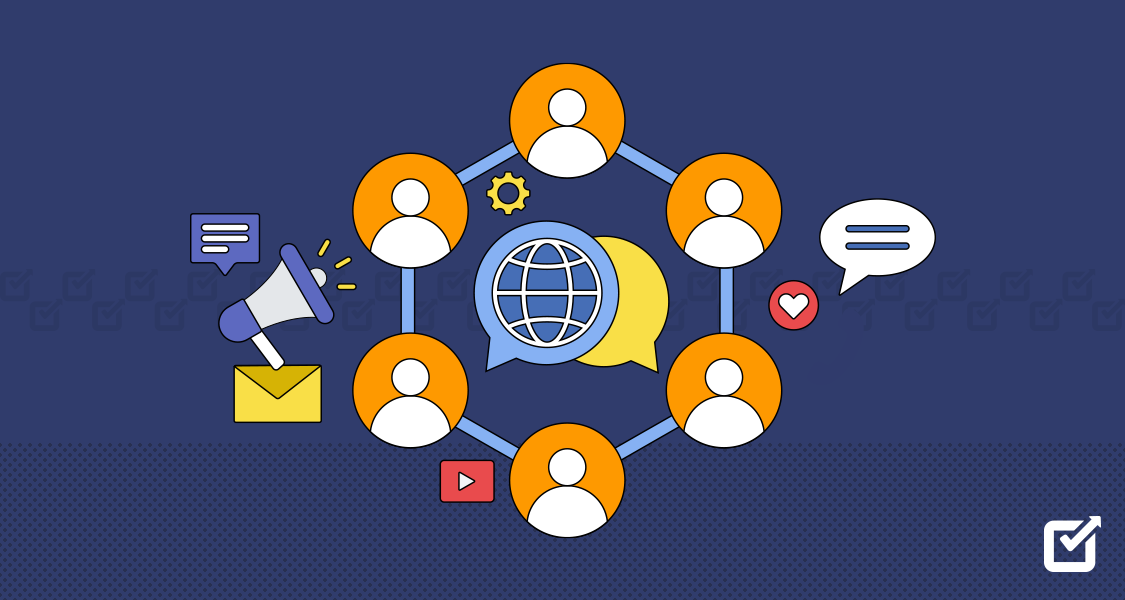Ever notice how we humans crave connection? It’s a built-in feature, pushing us to seek out company, share ideas, and belong to something bigger. All those family gatherings, close friendships, or even those nerdy clubs you joined in school are about connecting, right?
This thought extended to the digital world, and today, we have such large online communities spread everywhere on social media platforms. Trust me, social media trends always come and go, but one thing that remains constant is an online community.
But hold on a sec; not all online spaces can be considered communities. Sure, your Twitter followers or livestream viewers are great, but they don’t quite have the same depth and connection as a true online community.
So, what really makes an online community tick? Let’s break it down and find out what separates the real deal from the rest.
Before further ado, if you are one of those people who are super active in community groups, then you should at least give it a try to social media schedulers.
Online Community – Basics
An online community is a virtual gathering place where people with shared interests, goals, or identities come together to connect, collaborate, and communicate over the Internet. These communities can take various forms, such as forums, social media groups, or specialized platforms tailored to specific niches.
These communities exist on specific platforms made for easy interaction and connection. They are simply spaces where like-minded individuals come together online.
For instance, Reddit serves as a vast online community with diverse ‘subreddits’ where members discuss topics ranging from pets to politics. Facebook Groups provide spaces for people to connect over shared interests, whether gardening, cooking, or support groups for health issues or parenting. On Instagram, hashtags promote communities for food lovers (#foodie), travel enthusiasts (#wanderlust), and fitness fans (#fitspo).
The Discord community offers servers for chatting about specific topics or gaming together, attracting a wide range of interests beyond gaming. Meanwhile, Quora serves as a platform for knowledge-sharing and connection through questions and answers on various subjects.
Online platforms also include:
- Membership Websites
- Social Media Groups
- Forums
- Online Chat Rooms
- Creator Platforms
Want to Engage in Interesting Discussions? Join Social Champ on Discord!
Join Social Champ’s welcoming Discord community, where respectful exchanges, knowledge sharing, and open-mindedness pave the way for enriching connections.
Why Build an Online Community – 5 Important Reasons
Building an online community offers opportunities for connection, collaboration, and growth. It provides a platform to foster a sense of belonging, share knowledge, and engage with a targeted audience.
Sense of Belonging
Online communities provide a sense of belonging and connection, particularly for individuals who feel isolated offline. They offer a space where people with shared interests, identities, or experiences can come together to support and relate to one another.
Knowledge Sharing and Collaboration
These communities serve as platforms for knowledge exchange and collaboration. Members can share insights, expertise, and resources, leading to mutual learning and growth. This collective wisdom often promotes innovation and problem-solving within the community.
Support and Empowerment
An Online community can offer its members emotional support, encouragement, and empowerment. Whether seeking advice, sharing personal struggles, or celebrating achievements, these communities provide a safe and understanding space for individuals to express themselves and receive peer support.
Professional Networking and Growth
Many online communities cater to specific professions or industries, serving as valuable professional networking platforms. These communities facilitate connections with peers, mentors, and potential collaborators and opportunities for career development, skill-building, and knowledge advancement.
Social Change and Advocacy
Such communities can mobilize individuals around important social causes, amplifying voices and driving collective action. They serve as hubs for activism, advocacy, and awareness-raising, enabling members to effect change locally, nationally, and globally.
How to Build an Online Community [6 Easy & Simple Steps]
Building an online community may seem daunting, but it can be both easy and fulfilling with the right approach. Following simple steps and promoting genuine connections can cultivate a vibrant digital space where people feel connected and valued. Let’s explore some easy and effective strategies to build your online community from scratch.
Step 1: Find a Niche
There’s one thing that every successful online community has in common, and that’s their focus on a specific niche. This means they specialize in one area and provide valuable content. To find your niche, consider what topics your audience is most interested in or finds useful.
For example, take the online community ‘r/personalfinance’on Reddit. It’s all about personal finance matters. People go there to get advice, share their experiences, and talk about money. When sticking to this niche, ‘r/personalfinance’ has become a trusted place for financial help and support.

Step 2: Define a Goal
Don’t rush. Start with the baby steps!
Defining your goal is essential for giving your online community direction and purpose. Without a clear vision, members may not understand the value of participating. They need to know what they can expect and how their involvement will benefit them.

For instance, consider the online community ‘Fitbit Community,’ built around the Fitbit brand. Its goal goes beyond just selling fitness trackers; the community aims to create a supportive environment for users to achieve their health and fitness goals.
Members share tips, challenges, and successes, creating a sense of camaraderie and motivation.
Step 3: Pick Your Structure
When deciding on the structure for your online community, you have two main options: forums or groups. Let’s break down each one to help you choose the right fit.
- Forums
- Groups
Forums are like organized discussion boards where posts are sorted into categories, making it easy for users to find what they want. For example, the ‘Stack Overflow’ community is structured as a forum, allowing developers to ask and answer questions on various programming topics.

On the other hand, group-based communities offer a more personal and interactive experience. Platforms like Facebook Groups or LinkedIn Groups allow members to share text-based posts and multimedia content like photos and videos.

This format encourages deeper connections among members and facilitates more dynamic conversations. For instance, the ‘Humans of New York’ Facebook group serves as a platform for individuals to share personal stories and experiences, eventually promoting empathy and understanding within the community.
Step 4: Create a Member Profile
Understanding your target audience is crucial for shaping your online community into a space that resonates with its members. Building a member profile helps you identify the needs and preferences of your community, allowing you to tailor your content and engagement strategies accordingly.
Start by asking questions like, ‘Who are your potential members? Are they primarily female, male, or a mix of both?’ and ‘Where are they located geographically?’
For instance, if you are creating an online community for pet lovers, knowing whether your members are mainly dog owners in urban areas or cat enthusiasts in rural settings can significantly influence the content and discussions you facilitate.
Take the example of ‘The Knot,’ an online community for brides-to-be. They have created member profiles based on demographics, such as age, location, and wedding preferences. This allows them to curate content ranging from wedding planning tips to vendor recommendations tailored to the specific needs of their audience.

Once you have insights into your members, focus on promoting inclusivity within your community. Try to establish ground rules that promote respectful communication and diversity of opinions.
For instance, the TED-Ed community encourages members to engage in constructive discussions while upholding the values of curiosity and open-mindedness.

Step 5: Create Community Guidelines
Another healthy step for a successful online community is to create strict guidelines that help you maintain a positive and respectful online environment. Just as you protect your brand image, you must safeguard your community’s integrity by establishing clear rules that promote safety, respect, and inclusivity.
Start by outlining appropriate language and behavior expectations within your community. For instance, the ‘Twitter Rules’ set clear guidelines on prohibited content, such as hate speech, harassment, and violence, fostering a safer and more welcoming platform for users to engage with.
In addition to defining acceptable conduct, consider outlining consequences for rule violations. Platforms like Reddit have a system of moderators who enforce community guidelines by removing inappropriate content and issuing warnings or bans to repeat offenders.
So, when implementing consequences, you can demonstrate your commitment to maintaining a healthy community environment.
Additionally, once your guidelines are established, make them easily accessible to members. You can pin the rulebook to the top of your forum or group page for quick reference or include them in the About section where members can readily access them.
Step 6: Set up Your Management
I mean, assign roles of admin and moderators.
Establishing management roles within your online community is essential for its smooth operation and growth. As your community flourishes, delegating tasks to trusted individuals who can help maintain its integrity and foster engagement among members is important.
Take the example of the ‘Subreddit’ community on Reddit. Subreddit moderators, often called mods, play a crucial role in overseeing discussions, enforcing rules, and promoting positive interactions. These moderators are selected from active and trusted members within the community based on their ability to manage content and maintain a welcoming atmosphere effectively. They have the authority to delete inappropriate posts, organize discussions, and assist members with inquiries, ensuring that the subreddit functions smoothly.
Similarly, in Facebook Groups, group admins serve as the primary moderators responsible for managing discussions, approving new member requests, and enforcing community guidelines. The group owner typically appoints these admins based on their credibility and reliability in maintaining the group’s standards and values.
Types of Online Community [With Examples]
Online communities come in various forms, each tailored to different interests and preferences. Social media platforms like Facebook groups and Twitter communities provide spaces for connecting with others and sharing content. Forums and message boards like Reddit and Quora offer structured discussions on specific topics, fostering knowledge exchange.
Brand Communities
Brand communities are formed around a specific brand, where customers, fans, and enthusiasts come together to engage with each other and the brand itself. These communities often share a common interest or passion for the brand’s products, services, or values.

Apple community For example, the Apple Support online community provides a platform for Apple product users to seek help, share tips, and discuss their experiences with Apple devices. Members of brand communities not only interact with each other but also with representatives from the brand, fostering a sense of belonging and loyalty.
Learning Communities
Learning communities are spaces where individuals gather to acquire knowledge, share expertise, and collaborate on educational endeavors. These communities facilitate peer-to-peer learning and mentorship, allowing members to exchange ideas and resources to enhance their skills and understanding in a particular subject area.

Khan academy An excellent example of a learning community is Khan Academy, a nonprofit organization offering free online courses and educational resources.
Networking Communities
Networking communities are platforms where individuals connect with peers, professionals, and experts to expand their professional networks, seek career opportunities, and exchange industry insights. These communities provide avenues for building relationships, sharing knowledge, and fostering collaborations within specific industries or interest areas.
One prominent example of a networking community is LinkedIn, a professional networking platform. LinkedIn enables users to create profiles highlighting their skills and experiences, connect with other professionals, join industry-specific groups, and participate in discussions and events.
Social Communities
Social communities are online spaces where individuals connect, share interests, and interact. These communities revolve around common hobbies, interests, or lifestyles and provide a platform for members to build friendships, exchange ideas, and support each other.
A notable example of a social community is Reddit, a vast network of communities (subreddits) covering various topics, from sports and gaming to cooking and gardening.
Fan Communities
Fan communities are online spaces where enthusiasts gather to celebrate and engage with their favorite artists, bands, movies, TV shows, or other forms of entertainment. These communities are characterized by a shared passion for a particular fandom and provide a platform for fans to connect, discuss, and express their admiration.

Weverse One prominent example of a fan community is the BTS (Bangtan Sonyeondan) fan community, known as the ‘ARMY, ’ which centered around the South Korean boy band BTS. The ARMY is a global community on a platform named ‘Weverse,’ which is solely dedicated to fans who come together to support and celebrate BTS’s music, performances, and achievements.
Insight Communities
Insight communities are developed solely for marketing purposes, where organizations engage with their customers or target audience to gather feedback, insights, and ideas for product development, marketing strategies, and decision-making processes. These communities serve as a direct line of communication between businesses and their customers, allowing for ongoing dialogue and collaboration.

Starbucks idea forum An example of an insight community is the Starbucks Idea Forum, where Starbucks customers can submit suggestions, provide feedback on existing products, and vote on ideas submitted by other community members.
Membership Communities
Membership communities are for individuals who join and pay a subscription or membership fee to access exclusive content, resources, and benefits. These communities typically offer valuable content, services, or networking opportunities not available to the general public.
One example of a membership community is Patreon, a platform where creators offer exclusive content and perks to their patrons in exchange for monthly financial support. Patrons gain access to behind-the-scenes content, early access to new releases, and special rewards based on their level of support.
Local Communities
The next we have in line is local communities that connect individuals who live in the same geographical area. These communities serve as hubs for residents to share information, resources, and events relevant to their local area, fostering a sense of belonging and community spirit.
One example of a local community is Nextdoor, a neighborhood-focused social networking platform where neighbors can communicate, share recommendations, and organize local events. Nextdoor allows residents to connect with nearby neighbors, discuss local issues, and stay informed about what’s happening in their neighborhood.

Nextdoor – example Communities of Action
A community that is committed to the cause!
Communities of action help individuals collaborate on specific projects or initiatives to create tangible social change or impact. These communities are characterized by a shared commitment to taking action and addressing pressing issues or challenges.
One example of a community of action is Change.org, a platform that allows users to create and sign petitions on various social, political, and environmental issues.

Change.org Communities of Circumstances
Communities of circumstance allow all individuals facing similar situations or circumstances to come together for support, understanding, and shared experiences. These communities allow people to connect with others going through similar challenges, allowing them to find solidarity and empathy.
One example of a community of circumstance is support groups for individuals with specific medical conditions or illnesses, such as the Cancer Survivors Network. These online communities offer a supportive environment where individuals can share their stories, seek advice, and find comfort from others who understand their experiences.

Cancer survivor network
Find Your Tribe in Social Champ’s Facebook Community!
Join Social Champ’s Facebook community for expert tips, engaging discussions, and a supportive network of fellow marketers!
8 Proven Benefits of Online Community
Online communities facilitate knowledge sharing and networking and offer a unique benefit: a sense of belonging. In today’s world, where distances often separate us, these digital spaces become virtual meeting points where individuals find like-minded peers, share experiences, and build meaningful connections.
This feeling of belonging contributes to mental well-being, creating a supportive environment where members feel understood and empowered to thrive.
So, let’s have a quick walkthrough of the benefits of online communities.
Knowledge Sharing
Online communities are virtual spaces where individuals with similar interests or goals come together to share their expertise, experiences, and insights. Through discussion forums, blogs, webinars, and other interactive features, members freely exchange information, ask questions, and offer advice.
This collaborative environment fosters continuous learning and skill development, allowing members to stay updated on industry trends, gain new perspectives, and enhance their knowledge in various areas.
Networking Opportunities
One of the key benefits of online communities is the opportunity to connect and network with like-minded individuals, professionals, and enthusiasts. These communities provide a platform for members to expand their professional and social circles, discover new opportunities, and forge valuable relationships.
Whether it’s finding potential collaborators, mentors, or clients, online communities offer a diverse pool of contacts and connections that can lead to career advancement, business partnerships, and personal growth.
Support System
Online communities serve as a source of emotional support, encouragement, and solidarity for their members. Whether seeking advice, sharing personal struggles, or celebrating achievements, members can rely on the community to provide a listening ear, offer guidance, and lend a supportive hand.
This sense of belonging creates a safe and welcoming space where individuals feel understood, valued, and empowered to overcome challenges and pursue their goals.
Access to Resources
Within online communities, members can access many resources, such as articles, tutorials, templates, tools, and other educational materials. These resources cover a wide range of topics and disciplines, catering to community members’ diverse interests and needs.
Whether it’s learning new skills, solving problems, or staying informed on industry developments, members can leverage these resources to enhance their knowledge, capabilities, and professional development.
Collaboration and Innovation
Online communities foster collaboration and innovation by bringing together individuals with diverse backgrounds, perspectives, and expertise. Through shared interests, goals, and challenges, members collaborate on projects, exchange ideas, and co-create solutions to complex problems.
This collaborative process sparks creativity, drives innovation, and leads to developing new products, services, and initiatives that benefit the community and beyond.
Increased Visibility
Building an online community enhances the visibility of your brand, cause, or expertise in the digital space. You establish yourself as a thought leader, influencer, or authority within your niche by creating valuable content, engaging with your audience, and fostering meaningful interactions.
This increased visibility not only attracts new followers, customers, or supporters but also strengthens your brand reputation and credibility in the eyes of your target audience.
Market Research
Online communities serve as valuable sources of insights into consumer preferences, behaviors, and trends. Businesses can leverage these communities to conduct market research, gather feedback, and test ideas in real-time.
When engaging with their target audience, businesses gain valuable feedback on product features, pricing, marketing campaigns, and customer satisfaction, helping them make informed decisions and stay ahead of the competition.
Customer Engagement and Loyalty
Engaging with customers through online communities fosters stronger relationships, builds trust, and increases customer loyalty. By providing value, addressing concerns, and soliciting feedback, businesses create a more personalized and interactive experience for their customers.
This enhanced engagement not only leads to higher customer satisfaction and retention but also generates word-of-mouth referrals, brand advocacy, and long-term loyalty among community members.
Online Community – A Hub for All
Online communities are essential hubs where people connect, learn, and support each other in various aspects of life. From sharing knowledge to offering emotional support, these digital spaces empower individuals to grow, collaborate, and make meaningful connections. As technology evolves, the potential of online communities to foster positive change and inclusivity remains boundless. Embracing and nurturing these communities can lead to a brighter, more connected future for everyone involved.
















